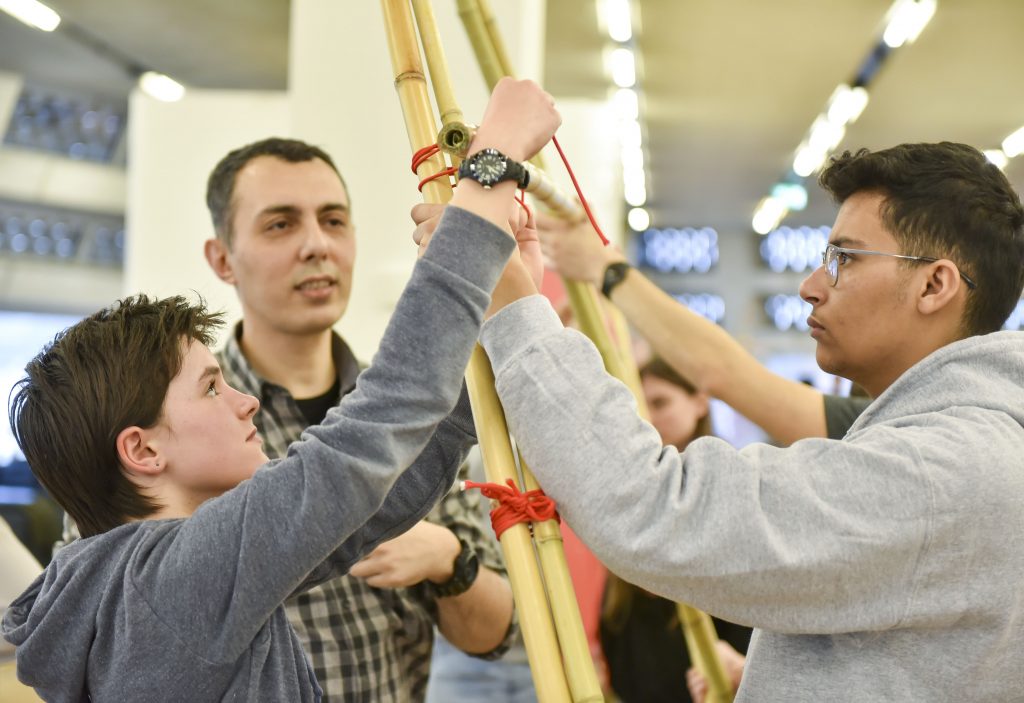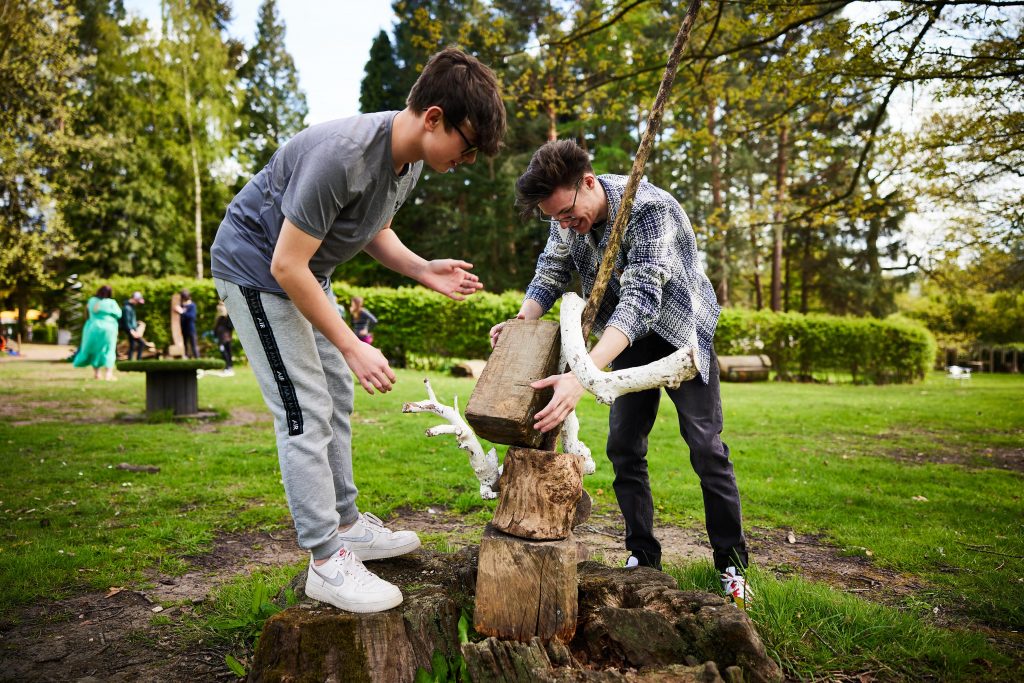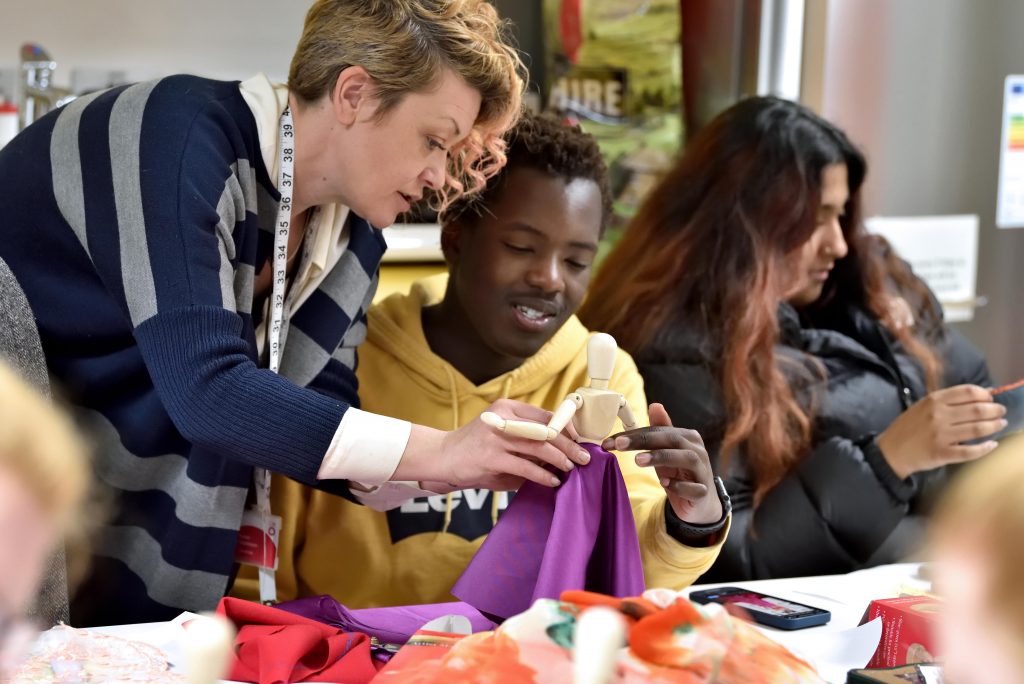Dr David Parker, our Special Advisor on Research and Evaluation, considers the National Saturday’s Club’s pedagogical approach at a time when, in the view of many in education and industry, the need to develop creativity, critical thinking and agency in young people has never been more vital.
A running theme in research carried out in the arts and culture sector is the way in which different domains – art, design, craft, literature – offer young people chances to develop valuable capacities and skills they may not access through their formal education. Much of this investigation, carried out in partnership with university departments and specialist bodies, such as the National Foundation for Educational Research (NFER) and Organisation for Economic Co-operation and Development (OECD), comes to share a common focus: how creative and critical capabilities can be encouraged.
When I began working with the National Saturday Club in 2019, I immediately saw resonances. Listening to tutors talk about how they approached their Saturday Clubs – how they recruited members, co-created session content, shared outcomes and reflected on learning – it was clear there were multiple commonalities in their mobilising of teaching and learning. The Club tutors’ pedagogical methods, discussed at regular meetings and networking sessions, were also, our evaluation would show, demonstrating numerous positive impacts on Club members. Across the course of a year-long Club programme, young people’s confidence increased, as did their ability to relate to and collaborate with fellow Club members from diverse backgrounds. Their application of creative and critical thinking to shared project-based work was also developed, as well as their enthusiasm for further study and careers in the subject area that they found inspiring.

The design of the National Saturday Club programme, underpinned by a partnership structure, is integral to its pedagogical impact. Drawn from nationwide higher education (HE) and further education (FE) institutions, and cultural organisations, Saturday Club tutors are able to apply a set of pedagogical methods that take advantage of the locale in which they are teaching: they are able to utilise the advanced facilities of their institution and create an environment that is distinct from young people’s formal educational experience.
In this more relaxed learning atmosphere, young people address tutors by their first names and work with student assistants from the host institution; experimentation and collaboration are encouraged, allowing young people to explore their capabilities and skills; and they are able to expand their potential without the imposition of any form of testing. These factors have engendered positive outcomes for both the young people engaging with Saturday Clubs and the tutors, who exchange information about the teaching practices they implement across the National Saturday Club network.
The National Saturday Club’s approach to evaluating its pedagogy sets out a range of pre- and post- questions related to five capacities identified in a model of creative development conceived by Bill Lucas, Ellen Spencer and Guy Claxton1. The model (opposite) illustrates how attributes associated with imagination, inquisitiveness, persistence, collaboration and discipline need to be in play and nurtured if young people are to evolve their creative and critical skills. The questions posed to Club members are designed to identify the degree of perceived competence that young people feel they acquire by attending a Saturday Club. The data so far shows us that their experience in the Club environment is an effective seedbed for them to develop key capabilities.
An important component of this outcome is the way in which tutors share ownership of their programme of activities, steering sessions toward young people’s interests and building their sense of engagement and agency. The young people thereby feel empowered to explore issues they care about, using methods that exercise their creativity and critical thinking. Tutors report progress in a number of key areas, and that the two years of online programming due to the Covid pandemic presented many opportunities for learning as well as challenges.


Commenting on her year of teaching in 2020–21, Eleanor Harrison, Science&Engineering Saturday Club tutor at Staffordshire University, says:
“We often used hypothesis testing prior to experiments, which helped with inquisitiveness, and in the second semester we started having students challenge each other’s ideas to improve this skill. As sessions this year were conducted online, collaboration was imperative in order to use technologies such as Sketchup and Sway effectively to produce pieces of work.
“We built Rube-Goldberg machines in the first semester of the Club, which helped build persistence, as when things went wrong we went through a gradual process of fixing problems. We have worked across multiple subject areas this year, so Club members have developed discipline expertise. Our learners have blown us away with how imaginative they have been. Even though the Club was virtual, they always came up with interesting ideas.”
The evaluation method employed by the National Saturday Club, integrating Lucas, Spencer and Claxton’s model, has two crucial advantages. First, it articulates a repertoire of shared practices deployed by tutors, showing how Clubs operate in an integrated and coherent way. Second, as the range of Club subjects continues to grow – Film&Media and Society&Change are two recent additions – using the development of versatile skills and a creative and critical disposition as a connecting thread between them means greater diversity of the National Saturday Club programme need not imply loss of focus.
“Even if our young people find careers in other areas, practising art and design can be a fantastic preparation for any career by teaching life skills such as creative thinking, problem-solving, motor skills, presentation, an eye for aesthetics, organisation, people skills and project management,” says Claire Corbey, Art&Design Saturday Club tutor at Coventry University.
“Our Club members have really shown their resilience, dedication and community spirit this year,” she continues, “and have been exceptional in the work that they have produced. The world needs thinkers, designers, explorers, makers, problem-solvers, leaders, those who question and those who ‘just go for it’. We have all those people in our Saturday Club.”
As the National Saturday Club network and programme grow, and as evaluation data builds, it will become possible to identify more precisely those elements of tutor pedagogy that are integral to encouraging adaptable skills and thinking in young people. We already know that Club tutors deploy a set of signature teaching methods, which run across all subjects. These include: taking risks and making mistakes in order to learn; working at the edge of comfort zones; using language that highlights the provisionality of competence – “I can’t do this yet”; allowing time ‘off task’ for thoughts to evolve; and valuing testing and playfulness as much as final products.
It is evident that Club tutors operate in ways that give learners space to become co-creators of their own experiences, and this deepens learners’ engagement leading to stronger outcomes. Creative and analytic capacities are teachable, but ultimately are actualised by the sense of agency that young people develop around their own practice. Young people must own their creative and critical capabilities and make them part of their personal learning process. Saturday Clubs help them to do this. Looking forward, the National Saturday Club will do further evaluative work to consider and understand other positive outcomes for Club members, such as the impact that the Saturday Club environment has on young people’s sense of wellbeing and confidence; and how local ecologies of support can help augment their learning experience.


Of course, there are broader reasons to consider fostering versatile skills and capacities as desirable. The need for original, inventive and imaginative approaches to tasks and problems is recognised globally by educators and industry alike. Andreas Schleicher, OECD’s Director of Education and Skills, asserts that we “…need to nurture…creativity and critical thinking, help [young people] look at things from different perspectives, understand the limits of theirs or others’ views, and help transform their ideas into innovative solutions: inquire, imagine, do and reflect, as our OECD rubrics on creativity and critical thinking put it.”2
Reviewing their experience of teaching a Club, and the impact of its members interacting with industry professionals through the National Saturday Club’s Masterclass initiative, Mor Schwartz Foulser and Jordan Fergusson, Fashion&Business lead tutors at Manchester Metropolitan University, commented:
“While some Club members were very target-oriented, looking to develop their fashion design skills further, others were less clear about their motivation. The most significant change occurred after the Saturday Club Masterclass. They then understood that fashion crosses with other fields like animation, and that the best creative approach is to go with your intuition and not be afraid of the unknown. Their view on fashion changed, and they understood that it was all about inspiration and exploration.
“That is when we introduced more complex concepts, such as speculative design, and challenged the standard class set-up by turning presentations into a supportive, reflective chat. We worked and talked in circles, where every voice was equal and collaborations happened naturally.”
A pedagogical approach that places an emphasis on learning by investigation and exposure to a spectrum of creative and thought-provoking activities would seem to indicate numerous positive benefits. Not only are these important to facilitate better quality learning – the difference between really knowing something and merely retaining information for tests – they will also be vitally important in the future world of work. There is growing appreciation therefore that education needs to prioritise the principles of learning as much as it does the content of a curriculum. As educators and employers deem creative and critical capabilities more and more significant and desirable, learning experiences such as those offered by the National Saturday Club will only gain in importance and relevancy for young people.
1. Teaching Creative Thinking: Developing Learners Who Generate Ideas and Can Think Critically (Pedagogy for a Changing World), Crown House, 2018
2. Fostering Students’ Creativity and Critical Thinking: What it Means in School, Foreword, page 3, OECD
This article first appeared in the National Saturday Club’s 2021-22 Annual Review
Features edited by Rachael Moloney